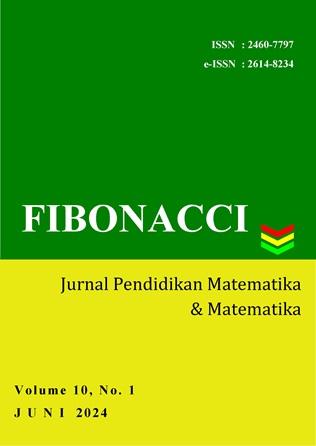UPAYA PENINGKATAN HASIL BELAJAR MATEMATIKA MELALUI PENERAPAN MODEL PEMBELAJARAN PROBLEM-BASED LEARNING
Main Article Content
Abstract
Article Details
Authors who publish with this journal agree to the following terms:
- Authors retain copyright and grant the journal right of first publication with the work simultaneously licensed under a Creative Commons Attribution License that allows others to share the work with an acknowledgement of the work's authorship and initial publication in this journal.
- Authors are able to enter into separate, additional contractual arrangements for the non-exclusive distribution of the journal's published version of the work (e.g., post it to an institutional repository or publish it in a book), with an acknowledgement of its initial publication in this journal.
- Authors are permitted and encouraged to post their work online (e.g., in institutional repositories or on their website) prior to and during the submission process, as it can lead to productive exchanges, as well as earlier and greater citation of published work (See The Effect of Open Access).
References
Anwar, K., & Jurotun, J. (2019). Peningkatan aktivitas dan hasil belajar siswa SMA pada dimensi tiga melalui model pembelajaran PBL berbantuan alat peraga. Kreano, Jurnal Matematika Kreatif-Inovatif, 10(1), 94–104. https://doi.org/10.15294/kreano.v10i1.19366
Astuti, P. H. M., Bayu, G. W., & Aspini, N. N. A. (2021). Penerapan model pembelajaran Problem Based Learning untuk meningkatkan hasil belajar matematika siswa. Jurnal Mimbar Ilmu, 26(2), 243–250. https://ejournal.undiksha.ac.id/index.php/MI
Kamarianto, Noviana, E., & Alpusari, M. (2018). Penerapan model pembelajaran Problem Based Learning untuk meningkatkan hasil belajar IPS Siswa kelas IV SD Negeri 001 Kecamatan Sinaboi. Jurnal Online Mahasiswa, 5(1).
Li, H. C., & Tsai, T. L. (2017). The implementation of problem-based learning in a Taiwanese primary mathematics classroom: lessons learned from the students’ side of the story. Educational Studies, 43(3), 354–369. https://doi.org/10.1080/03055698.2016.1277138
Li, H.-C., & Tsai, T.-L. (2022). The effects of a problem-based learning intervention on primary students’ performance on greatest common factor and least common multiple and on their attitudes towards mathematics Tsung-Lung Tsai. Int. J. Innovation and Learning, 31(1), 51–69.
Malanua, Moh. K., Pomalato, S. W. Dj., & Damayanti, T. (2024). Kemampuan literasi matematika siswa dalam menyelesaikan soal cerita aljabar ditinjau dari self efficacy matematika. Fibonacci, 10(1), 1–20. https://doi.org/10.24853/fbc.10.1.1-20
Mashuri, S., Djidu, H., & Ningrum, R. K. (2019). Problem-based learning dalam pembelajaran matematika: Upaya guru untuk meningkatkan minat dan prestasi belajar siswa. Pythagoras: Jurnal Pendidikan Matematika, 14(2), 112–125. https://doi.org/10.21831/pg.v14i2.25034
Merritt, J., Lee, M. Y., Rillero, P., & Kinach, B. M. (2017). Problem-based learning in K-8 mathematics and science education: A literature review. Interdisciplinary Journal of Problem-Based Learning, 11(2). https://doi.org/10.7771/1541-5015.1674
Mudhofir, A. (2021). Effect of Problem Based Learning Model Combination Flipped Classroom Against Problem Solving Ability. The International Journal of High Education Scientists (IJHES), 2(2), 11–26. www.ijhes.com
Munawaroh, S. (2021). Upaya peningkatan aktivitas dan hasil belajar peserta didik di SMPN 3 Banguntapan melalui model pembelajaran Problem-Based Learning. Jurnal Inovasi Keguruan Dan Ilmu Pendidikan No, 1(1), 89–100.
Nurfadillah, L., Santosa, C. A. H. F., & Novaliyosi. (2020). Pengaruh model pembelajaran flipped classroom terhadap kemampuan berpikir kritis matematis siswa. Wilangan: Jurnal Inovasi Dan Riset Pendidikan Matematika, 1(2), 215–225. http://www.jurnal.untirta.ac.id/index.php/wilangan
Nurlaeli, Noornia, A., & Wiraningsih, E. D. (2018). Pengaruh model pembelajaran model Problem Based Learning terhadap kemampuan berpikir kritis matematis siswa ditinjau dari adversity quotient. Fibonacci, 4(2), 145–153.
Purnamasari, M., Isman, J., Damayanti, A., & Ismah. (2017). Upaya meningkatkan hasil belajar matematika terhadap konsep bangun ruang materi luas dan volume balok dan kubus menggunakan metode drill sekolah SMP Islam Al-Ghazali kelas VIII. Fibonacci: Jurnal Pendidikan Matematika Dan Matematika, 3(1), 45–52.
Puspita, M., Slameto, & Setyaningtyas, E. W. (2018). Peningkatan hasil belajar matematika siswa kelas 4 SD melalui model pembelajaran Problem Based Learning. JUSTEK: Jurnal Sains Dan Teknologi, 1(1), 120–125.
Ramli, F., Ayub, A. F. M., Zulnaidi, H., Salim, N. R., & Gopal, K. (2020). Impact of problem-based learning strategy on students’ mathematical value among secondary school students. Universal Journal of Educational Research, 8(8), 3295–3302. https://doi.org/10.13189/ujer.2020.080801
Ratnasari, I. W. (2017). Hubungan minat belajar terhadap prestasi belajar matematika. Psikoborneo, 5(2), 289–293.
Sudjana, N. (2016). Penilaian Proses Hasil Belajar Mengajar. Remaja Rosdakarya.
Susilo, H., Chotimah, H., & Sari, Y. D. (2022). Penelitian Tindakan Kelas (S. wahyudi, Y. Setyorini, & I. Basuki, Eds.). Bayumedia Publishing.
Tildjuir, Y., Limbong Tampang, B., & Sangi, N. (2021). Penerapan model Problem Based Learning untuk meningkatkan hasil belajar dasar-dasar listrik. Jurnal Edunitro: Jurnal Pendidikan Teknik Elektro, 1(2), 27–34.
Yew, E. H. J., & Goh, K. (2016). Problem-Based Learning: An Overview of its Process and Impact on Learning. In Health Professions Education (Vol. 2, Issue 2, pp. 75–79). King Saud bin Abdulaziz University. https://doi.org/10.1016/j.hpe.2016.01.004
Zamir, S., Yang, Z., Wenwu, H., & Sarwar, U. (2022). Assessing the attitude and problem-based learning in mathematics through PLS-SEM modeling. PLoS ONE, 17(5 May). https://doi.org/10.1371/journal.pone.0266363

